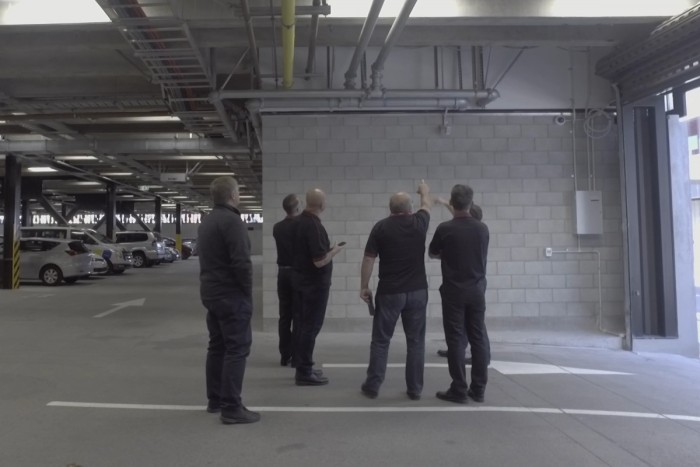Fire Engineer
Mataaro Ārai Ahi
Alternative titles for this job
Fire engineers plan and design safety features that detect, control or reduce fire and smoke in buildings and structures. They also analyse how fire behaves and how safety features perform in fire.
Pay
New fire engineers usually earn
$70K-$90K per year
Senior fire engineers who work as team leaders usually earn
$120K-$180K per year
Source: Institute of Fire Engineers New Zealand Branch, 2019.
Job opportunities
Pay
Pay for fire engineers depends on qualifications and experience.
- Graduate fire engineers usually start on $70,000 to $90,000 a year.
- Mid-level fire engineers with three to five years' experience usually earn between $90,000 and $120,000.
- Senior fire engineers with five or more years' experience, who also work as team leaders can earn from $120,000 to $180,000.
Source: Institute of Fire Engineers New Zealand Branch, 2019.
(This information is a guide only. Find out more about the sources of our pay information)
What you will do
Fire engineers may do some or all of the following:
- design features in buildings and structures to detect, control or reduce fire and smoke damage
- design or review safety feature modifications in renovated buildings
- discuss designs with colleagues, architects, electrical engineers, or builders
- create detailed drawings for fire safety features
- produce technical instructions for, and assessments of, safety features, and do design calculations
- create computer models to predict how fire will behave in buildings or structures
- analyse how fire safety features performed after a fire.
Skills and knowledge
Fire engineers need to have knowledge of:
- how fire and smoke behave, and how people behave in fires
- how fire affects building materials
- building design techniques and engineering principles
- building and emergency legislation
- how to use computer-aided design (CAD) software.
Working conditions
Fire engineers:
- usually work regular business hours, but may need to be on call
- work in offices
- may work in hazardous conditions, such as in buildings after fires
- may travel locally to attend site meetings, assess building sites, or analyse structures after fires.
What's the job really like?

Angela Fearnley
Fire Engineer
How did you become a fire engineer?
"I wanted to do something that would help people, but I couldn't handle needles or blood. I found my way into fire engineering through a Bachelor of Mechanical Engineering. I'm still doing a job where I'm helping people."
What do fire engineers do?
"We work on lots of different projects, from office buildings, to hospitals, prisons and airports.
"We use a fire dynamics simulator (FDS) to model fire and smoke in a building. Here at Beca we also use Pathfinder – an evacuation model – to determine how long it takes people to evacuate."
What's an interesting part of your job?
"I got to be a part of a live fire test. Basically, we got to observe BRANZ (Building Research Association of New Zealand) light a fake fire in a brand new building with a large atrium. Our job was to test all the smoke curtains and the smoke extraction. The whole atrium was filled with artificial smoke so it didn't damage the inside of the building, but it still looked like real smoke."
What's rewarding about being a fire engineer?
"My favourite reward of the job is when you finish a project and get to see the end result. For me the reward is basically being able to walk past a project and say 'I was a part of the team that made that happen.' "
Entry requirements
To become a fire engineer you need to have a Bachelor of Engineering (Hons), and a Master of Engineering in fire engineering. You may be able to complete the Master's degree on the job.
Fire engineers may choose to become Chartered Professional Engineers (CPEng) after three to five years of industry experience.
Secondary education
A tertiary entrance qualification is required to enter further training. Useful subjects include English, maths, physics, and construction and mechanical technologies.
Personal requirements
Fire engineers need to be:
- analytical and good at problem solving
- adaptable and creative
- accurate, practical and good at planning
- able to work well under pressure and in a team
- strong communicators, and able to explain complicated ideas in simple language.
Communication and planning are valuable skills because fire engineering needs to be co-ordinated between lots of different disciplines.

Angela Fearnley
Fire Engineer
Useful experience
Useful experience for fire engineers includes:
- any voluntary or paid firefighting work
- general engineering work
- any work in the building industry
- any experience in the armed forces.
Registration
Fire engineers who complete a Master of Engineering in fire engineering and have three to five years' work experience can apply to Engineering New Zealand to gain registration as a Chartered Professional Engineer (CPEng).
Find out more about training
- Canterbury University
- (03) 369 3113 - enquiries@civil.canterbury.ac.nz - www.canterbury.ac.nz
- Engineering NZ
- (04) 473 9444 - hello@engineeringnz.org - www.engineeringnz.org
- Society of Fire Protection Engineers (NZ)
- (09) 308 7030 - secretary@sfpe.org.nz - www.sfpe.org
What are the chances of getting a job?
Growing demand for fire engineers
Demand for fire engineers is growing due to:
- an ageing workforce, with many fire engineers approaching retirement age
- new legislation on fire safety and evacuation schemes, which is creating more work for fire engineers.
However, not enough graduates are coming through to fill vacancies. Many employers report that they recruit workers from overseas due to a shortage of graduates and experienced fire engineers in New Zealand.
There are about 800 fire engineers and 200 fire engineering companies in New Zealand.
Opportunities for graduates
Many large fire engineering companies:
- offer internships to engineering students
- pay for graduates to complete a Master of Engineering in fire engineering on the job.
Types of employers varied
Fire engineers may work for:
- construction and fire engineering businesses
- Fire and Emergency New Zealand
- insurance firms
- local government.
Fire engineers may also be self-employed.
Sources
- Fearnley, T, president, Institute of Fire Engineers New Zealand Branch, careers.govt.nz interview, December 2018.
- Gilson, L, 'Developing a Qualification for Industry', 28 June 2018, (www.pslfireandsafety.co.nz).
(This information is a guide only. Find out more about the sources of our job opportunities information)
Progression and specialisations
After completing a Master of Engineering in fire engineering and then three to five years of work experience, fire engineers may progress to become Chartered Professional Engineers (CPEng) or Chartered Engineers (CEng), and work as team leaders or oversee projects.
Fire engineers may specialise in designing safety features for:
- railways
- tunnels and mines
- confined spaces in buildings or structures
- space technology such as rockets
- ships.
Last updated 6 March 2025


